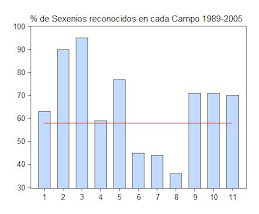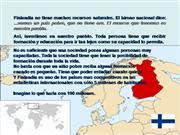Foto: Many university researches suffer stress due to endless amounts of perverse bureacratic abuses from EU and other institutions.
Updated 21st June 2010.
1) EUROPEAN RESEARCHERS AGAINST WRONG CRITERIA OF CITATIONS IMPACT RATING AND MANAGERIAL GOVERNANCE FOR RESEARCH EVALUATION AND FUNDING: Quality should be more important than citation impact factors and other metric indicators, in all sciences and particularly for evaluation in Social Sciences and Humanities. While in Nature Sciences (NS) it may be sometimes a high correlation between quality of research and the number of citations in the more cited journals, generally it is not the case for the Social Sciences and Humanities (SSH) where the correlation may be very weak. Here we include some selected articles and links on this important question:
Denmark: Two nteresting articles by Thomas Soderqvist, Copenhaguen.
Humanities journals under threat from the European research bureaucracy (ERIH) 2008 17h July. "Under the heading ”Journals under Threat: A Joint Response from HSTM Editors” ten editors of some of the leading international journals for history and philosophy of science and social studies of science have issued a joint declaration against the current attempts, initiated by the European Science Foundation, to establish a European rating system for humanities journals ...." "We now confront a situation in which our own research work is being subjected to putatively precise accountancy by arbitrary and unaccountable agencies" "Truly ground-breaking work may be more likely to appear from marginal, dissident or unexpected sources, rather than from a well-established and entrenched mainstream. Our journals are various, heterogeneous and distinct...Their scope and readership say nothing about the quality of their intellectual content".
University heritage is back: 2010, 5th May: "Is it the gradual implementation of New Public Management in universities that is eventually giving rise to a reaction? Are university people becoming so frustrated with managerial governance, new evaluation schemes and assessment procedures, and the nauseating hype of their central communication offices that we are looking back to those times when universites were still universities? Is the renewed interest in university heritage an expression of our longing for the good old days of university self-governance?"
France: Coming soon
Germany: Coming soon
Netherlands: Nature reports the declaration of Anthony Van Kaan, Director of the Centre for Science and Technology Studies at Leiden University (Netherlands), against the inconvenience to evaluate individual articles or reserarchers based on bibliometric criteria: "If there is one thing that every bibliometrician agrees, it is that you should never use the journal impact factor to evaluate research performance for an article or for an individual - that is a mortal sin".
Of course the writer refers to "intelligent bibliometricians".Spain: A country with many problems due to the misuse of bibliometric criteria for individual evaluation of researchers by some Commissins named by the Ministry of Education. Protestors have joined the Manifesto of Sexenios signed by two thousand university teachers, claiming for a fair evaluation.
Source. Nature nº 465 of June 2010: http://www.nature.com/news/2010/100616/full/465864a.html
Germany: Coming soon
Netherlands: Nature reports the declaration of Anthony Van Kaan, Director of the Centre for Science and Technology Studies at Leiden University (Netherlands), against the inconvenience to evaluate individual articles or reserarchers based on bibliometric criteria: "If there is one thing that every bibliometrician agrees, it is that you should never use the journal impact factor to evaluate research performance for an article or for an individual - that is a mortal sin".
Of course the writer refers to "intelligent bibliometricians".Spain: A country with many problems due to the misuse of bibliometric criteria for individual evaluation of researchers by some Commissins named by the Ministry of Education. Protestors have joined the Manifesto of Sexenios signed by two thousand university teachers, claiming for a fair evaluation.
Source. Nature nº 465 of June 2010: http://www.nature.com/news/2010/100616/full/465864a.html
Spanish Sexenios Manifesto. Declaration of more than 2000 university researchers against the unadequate metric criteria used by the Committee CNEAI, appointed by the Ministery of Education, on individual researchers evaluation. The criteria do not recognize many important contributions to scientific research in several fields, particularly in Economics and Social Sciences (approximately 50% of signers of Manifesto are researchers of Economics), and has led to injustices and strong stress supported my thousands of researchers for the period 1994-2010. The declaration launched in year 2003 has been endorsed by important social and scientific organizations during the period 2003 to 2010, but the problem unfortunately remains yet unsolved. More information in Spanish (becoming an English Summary) at:
Articles in English by Spanish researchers against the wrong use of impact metrics for evaluation of researchers and research funding:
"The Weakness of the Scientific Assessments: A Praise of Silence", by Jose Carlos Bermejo-Barrera, Professor of History and former Dean of the Faculty of History and Geography of the USC (Spain)http://arxiv.org/abs/physics/0602167
United Kingdom: The Committe of Science and Tecnology has shown opposition to bureaucratic misues related with bibliometric indexes and impact factors. The Tenth Report of year 2004 has stated that research should be evaluate by the quality and interest of its contents and not by bibliometrics criteira:
"The perception that the RAE (Research Assessment Exercise) rewards publication in journals with high impact factors is affecting decisions made by authors about where to publish. We urge HEFCE (Higher Education Founding Council for England) to remind RAE panels that they are obliged to assess the quality of the content of individual articles, not the reputation of the journal in which they are published".
2) TRUST IN RESEARCHERS: An interesting declaration against over-bureaucracy in European Union has been signed by more than 13 thousand university researchers in Europe and will be presented to the European Parliament in order to request protection from this institution against the perverse system of the EU Commission that over load reserarchers with overwhelming bureaucracy, which seem to be based on untrust on researchers imposing an endless number of bureaucratic requisites, instead of offering adequate support to European researchers.
Web address with information, declaration, signatures and sign up form:
Web address with information, declaration, signatures and sign up form:
http://www.trust-researchers.eu/index.php?file=home.php
The campaign Trust in researchers has finished. Commisariat of Science has declared that some changes will be made in the next months in order to diminish unnecessary bureaucracy and to give more support to researchers. Nature reports on the positive expectations about Mr. Smit, the new chief of European Research to enter in power on July 2010.
Turst in researchers home: http://www.trust-researchers.eu/index.php?file=home.php
Press coverage: http://www.trust-researchers.eu/index.php?file=media.htmThe campaign Trust in researchers has finished. Commisariat of Science has declared that some changes will be made in the next months in order to diminish unnecessary bureaucracy and to give more support to researchers. Nature reports on the positive expectations about Mr. Smit, the new chief of European Research to enter in power on July 2010.
Turst in researchers home: http://www.trust-researchers.eu/index.php?file=home.php
Note in Spanish: En esta entrada incluimos información sobre la rebelión de los investigadores universitarios europeos contra los abusos burocráticos en la evaluación de la investigación y en la concesión de ayudas de la UE. El Manifiesto ha sido firmado en el año 2010 por más de 13000 investigadores y ya ha sido enviado a las autoridades europeas relacionadas con la investigación científica. Se esperan cambios con el nuevo nombramiento de Mr. Smit en la simplificación burocrática, y posiblemente otros también de interés, según las noticias de la revista Nature de 15 de junio de 2010.
More information at at World Development: European Universities:
"European Universities: Reactions to abuses and misuses of bibliometrics and bureaucracy in evaluation of researchers"






























